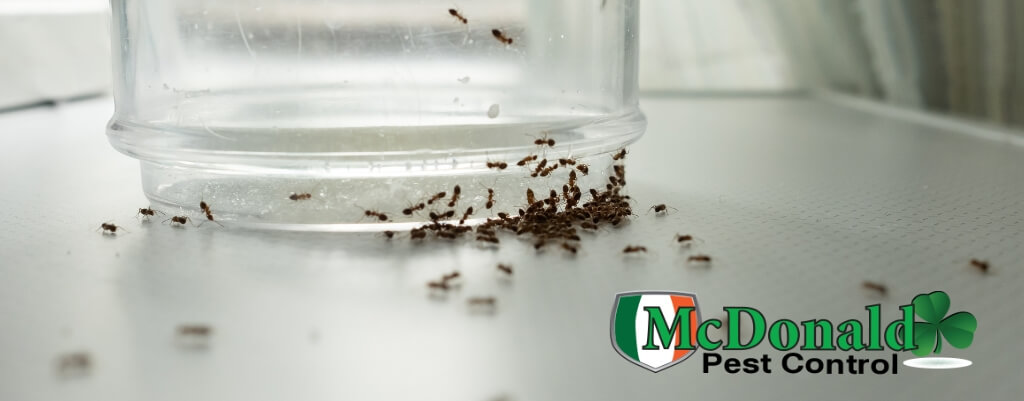Are ants invading your kitchen sink area? Yes, this guide provides effective solutions to eliminate ants around your kitchen sink, focusing on natural methods, baits, and preventative measures. We’ll cover everything from identifying the source of the infestation to implementing long-term strategies to keep your kitchen ant-free.

Image Source: www.mcdonaldpestcontrol.com
Why Are Ants Attracted to Your Kitchen Sink?
Ants are drawn to kitchens for a few very simple reasons: food and water. Your kitchen sink area offers both, making it an ideal buffet for these tiny pests.
- Food Residue: Even small crumbs or spills around the sink, on the countertop, or even down the drain can attract ants. They have a strong sense of smell and can detect these food sources from quite a distance. Small ants kitchen counter are often attracted to sweet or greasy residues.
- Water Source: Leaky faucets, condensation, or even standing water in the sink itself provide essential moisture that ants need to survive. This is especially true during dry seasons when other water sources are scarce. Ants coming from under sink might be attracted to moisture from leaky pipes.
- Shelter: The dark, damp space under the sink can offer a safe and protected environment for ant colonies to establish themselves. This is especially true if there are cracks or crevices in the cabinets or walls.
Identifying the Type of Ant
Before you begin treatment, it’s helpful to identify the type of ant you’re dealing with. This can help you choose the most effective ant control kitchen methods. Here are some common kitchen ants:
- Pavement Ants: Small, dark brown or black ants that often nest in cracks in sidewalks or foundations.
- Odorous House Ants: Emit a foul odor when crushed. These ants are small, brown, and attracted to sweets.
- Pharaoh Ants: Very small, yellowish-brown ants that are difficult to control due to their ability to bud into multiple colonies.
- Carpenter Ants: Large, black ants that nest in wood. If you see these, it could indicate a more serious structural problem.
Step-by-Step Guide to Eliminating Ants
Here’s a detailed approach to get rid of ants around your kitchen sink:
1. Cleaning Up the Source
The first and most crucial step is to eliminate the food and water sources that are attracting the ants.
- Clean the Sink Area: Thoroughly clean the sink, countertops, and surrounding areas with soap and water. Remove any food particles or spills immediately.
- Clear the Drain: Food debris often accumulates in the drain, providing a feast for ants. Flush the drain with boiling water or use a drain cleaner to remove buildup. This is essential to eliminate ants kitchen drain.
- Wipe Down Surfaces: Use a disinfectant wipe or spray to clean surfaces and remove any lingering ant trails. Ants leave pheromone trails that guide other ants to food sources.
- Empty Trash Regularly: Keep your trash can clean and empty it frequently. Food waste in the trash is a major attractant for ants.
- Store Food Properly: Store all food in airtight containers to prevent ants from accessing it.
2. Using Natural Ant Repellents
If you prefer a natural approach, several substances can act as natural ant repellent sink:
- Vinegar: Mix equal parts white vinegar and water in a spray bottle. Spray this solution around the sink, along ant trails, and in areas where you see ants. Vinegar disrupts their scent trails and repels them.
- Lemon Juice: Similar to vinegar, lemon juice can disrupt ant trails. Squeeze lemon juice around the sink and wipe down surfaces with it.
- Essential Oils: Certain essential oils, such as peppermint, tea tree, and eucalyptus, have ant-repelling properties. Mix a few drops of essential oil with water in a spray bottle and spray around the affected areas.
- Diatomaceous Earth (DE): This natural powder is made from fossilized algae and is safe for humans and pets. Sprinkle DE around the sink, along ant trails, and in areas where ants are entering. It works by dehydrating the ants’ exoskeletons. Note: Use food-grade DE.
- Borax: Mix borax with sugar and water to create a bait. The sugar attracts the ants, and the borax kills them. Place the bait in a shallow container near the ant trails. Note: Keep out of reach of children and pets.
3. Using Ant Baits
Ant baits are an effective way to kill ants around sink because they target the entire colony. The worker ants carry the bait back to the colony, where it is shared with other ants, including the queen. This ultimately leads to the colony’s demise. Here’s how to use best ant bait kitchen sink:
- Choose the Right Bait: There are different types of ant baits available, including liquid baits and gel baits. Choose a bait that is specifically designed for the type of ant you’re dealing with.
- Place the Bait Strategically: Place the bait near ant trails or in areas where you see ants foraging. Avoid placing the bait directly on top of ant trails, as this may deter them from taking it.
- Monitor the Bait: Check the bait regularly and replenish it as needed. It may take several days or even weeks to eliminate the entire colony.
- Be Patient: Don’t be tempted to spray the ants with insecticide while they are taking the bait. You want them to carry the bait back to the colony.
Types of Ant Baits
| Bait Type | Description | Pros | Cons |
|---|---|---|---|
| Liquid Baits | Contain a sugary liquid that attracts ants. | Effective for ants that prefer sweets. Easy to use. | Can dry out quickly. May attract other insects. |
| Gel Baits | Contain a gel-like substance that is attractive to ants. | Long-lasting. Effective for a wide range of ant species. Easy to apply in hard-to-reach areas. | Can be messy. May not be as attractive to ants that prefer liquid baits. |
| Granular Baits | Consist of small granules that ants carry back to the colony. | Effective for outdoor use. Can be broadcast over a large area. | Not as effective for indoor use. May be harmful to pets and wildlife if not used properly. |
4. Sealing Entry Points
To prevent ants kitchen sink from returning, it’s important to seal any entry points that they may be using to get into your kitchen.
- Caulk Cracks and Crevices: Use caulk to seal any cracks or crevices in the walls, around pipes, and under the sink.
- Seal Windows and Doors: Make sure that windows and doors are properly sealed. Use weather stripping to fill any gaps.
- Repair Leaks: Fix any leaky faucets or pipes to eliminate water sources that are attracting ants. This is important to prevent ant infestation kitchen sink.
- Check Under the Sink: Inspect the area under the sink for any holes or gaps. Seal them with caulk or foam sealant.
5. When to Call a Professional
While many ant infestations can be managed with DIY methods, there are times when it’s best to call a professional pest control service.
- Large Infestations: If you have a large ant infestation that you can’t control with DIY methods, it’s time to call a professional.
- Persistent Infestations: If you’ve tried various methods to get rid of ants, but they keep coming back, a professional can help identify the source of the problem and implement a more effective treatment plan.
- Carpenter Ants: If you suspect that you have carpenter ants, it’s important to call a professional immediately. Carpenter ants can cause serious structural damage to your home.
- Uncertainty: If you are unsure of what type of ants you have, or if you cannot locate the ant nest, a professional exterminator will be able to assist in identification and proper treatment.
Long-Term Prevention Strategies
Once you’ve eliminated the ants, it’s important to take steps to prevent them from returning.
- Maintain Cleanliness: Keep your kitchen clean and free of food debris. Wipe up spills immediately and clean the sink area regularly.
- Store Food Properly: Store all food in airtight containers.
- Control Moisture: Fix any leaky faucets or pipes and ensure that there is no standing water in or around the sink.
- Trim Vegetation: Trim bushes and trees that are touching your house, as these can provide a bridge for ants to enter.
- Regular Inspections: Inspect your home regularly for signs of ant activity.
Additional Tips and Tricks
- Use Ant Traps: Place ant traps in areas where you see ants foraging. These traps contain a sweet bait that attracts ants and kills them.
- Create a Barrier: Create a barrier around your house using a product like diatomaceous earth or ant repellent granules.
- Consider Professional Pest Control: If you’re struggling to control the ants on your own, consider hiring a professional pest control service.
Frequently Asked Questions (FAQ)
- What attracts ants to my kitchen sink?
- Ants are attracted to food residue, water sources, and shelter in the kitchen sink area.
- Can I use bleach to kill ants?
- While bleach can kill ants on contact, it’s not a long-term solution and can be harmful to surfaces and humans. It’s better to use ant baits or natural repellents.
- Is baking soda effective against ants?
- Baking soda is not very effective against ants. Borax is more effective as it is toxic to them.
- How do I find the ant nest?
- Follow ant trails to see where they are coming from. The nest may be located indoors or outdoors.
- Are natural ant repellents safe for pets?
- Some natural ant repellents, such as essential oils, can be toxic to pets. Always check the label and keep repellents out of reach of pets. Diatomaceous earth is generally safe but can cause irritation if inhaled.
- Why are there so many ants after it rains?
- Rain can flood ant nests, forcing them to seek higher ground, including your kitchen.
- How often should I clean my kitchen sink to prevent ants?
- Ideally, clean your kitchen sink daily, especially after preparing meals. Regularly wiping down surfaces and clearing the drain prevents food buildup that attracts ants.
- What are some signs of a serious ant infestation that requires professional help?
- Signs include a constant presence of ants despite cleaning efforts, finding ant nests inside your home, or noticing structural damage potentially caused by carpenter ants.
If you follow these steps, you can wipe out the ants around your kitchen sink and make sure they don’t return. Just remember, the key is to not give up—staying consistent is how you really get the problem under control.

Hi, I’m Larry Fish, the mind behind MyGrinderGuide.com.. With a passion for all things kitchen appliances, I created this blog to share my hands-on experience and expert knowledge. Whether it’s helping you choose the right tools for your culinary adventures or offering tips to make your kitchen more efficient, I’m here to guide you. My goal is to make your time in the kitchen not only easier but also enjoyable! Welcome to my world of kitchen mastery!
